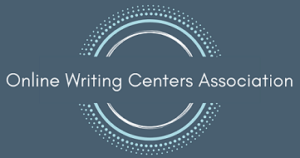During this August 20, 2019, conversation hour, attendees focused our discussion on OWC-related readings that we and our tutors have found most helpful. This was a timely discussion since this question had just come up on the WCenter listserv.
Below is a list of the resources and databases/lists that were shared:
Databases/Lists
- OWC Community scholarship database (the full publication information for all sources listed below can be found in our database)
- Allison Hutchison’s literature review bibliography
Resources
- The Online Writing Conference: A Guide for Teachers and Tutors by Beth Hewett (2015)
- Foundational Practices of Online Writing Instruction, edited by Beth Hewett and Kevin Eric DePew
- “Beyond the Lore: A Case for Asynchronous Online Tutoring Research” by Kathryn Denton (2017)
- “Developing Sound Tutor Training for Online Writing Centers: Creating Productive Peer Reviewers” by Lee-Ann Kastman Breuch and Sam Racine (2000)
- “The Invisible Interface: MS Word in the Writing Center” by Amber Buck (2008)
- “Comparing Technologies for Online Writing Conferences: Effects of Medium on Conversation” by Joanna Wolfe and Jo Ann Griffin (2012)
- Research in Online Literacy Education (ROLE) special issue on OWCs (in press)
- “Sync or Swim: (Re)assessing Asynchronous Online Writing Labs” by Matthew Schultz (2010)
- “This Rant Is Asynchronous“ by Mike A. Shapiro (2012)
- “The Online Writing Center Is About Equity for Students (and You Too)“ by Maggie Bertucci Hamper (2018)
- “Learning Online to Tutor Online: How We Teach Writing Tutors“ by Daniel Gallagher and Aimee Maxfield (2019)
Future Research
While attendees shared readings they’ve found helpful in the past, the consensus was also that the research of OWCs is in the beginning stages. Attendees articulated the need for OWC research that was focused on pedagogical and theoretical foundations, as much of the research is tied with the technology the OWC and researchers used. Separating pedagogical and theoretical foundations from technology will, to a certain degree, help create a stronger foundation for OWC work. An attendee mentioned that more OWC work that talks about working with different populations would also be helpful. We concluded the conversation hour by discussing how we as a field could take an interdisciplinary approach and apply frameworks from other disciplines (e.g., user design, IT) to OWC work.
We welcome your input on the questions discussed during this hour, along with one additional question:
- What OWC readings have you found most helpful? Why?
- What OWC readings have your tutors found most helpful? Why?
- What OWC research and scholarship would you like to see that aren’t out there yet?
- What research or frameworks from other disciplines could we apply to OWC work?
